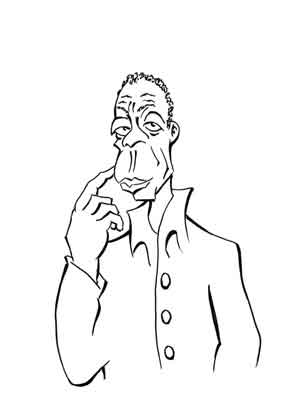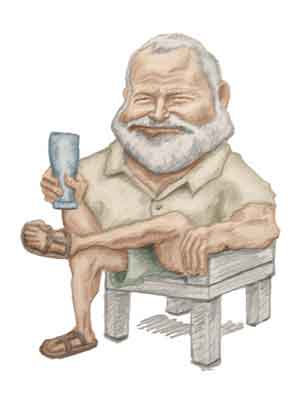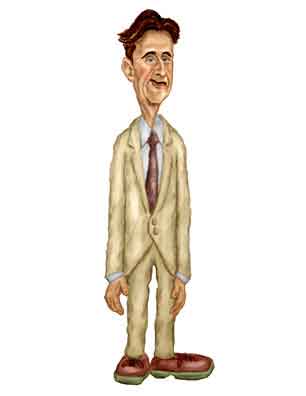James Baldwin

James Baldwin
Although today there are many authors who have major followings, what is rapidly disappearing is the celebrity author. No, no, we don't mean the film or television actors that provide steady employment to the crowd of sadly anonymous ghostwriters. We mean authors who actually wrote their own prose and because of their writings rose to the status of Hollywood movie stars.
True such famous writers still exist, of course, but they are increasingly rare. But few such authors are, as we would say, "serious" writers. In fact, the most famous writers today specialize in science fiction, fantasy, romance, and ...
Well, we'll skip that last bit.
But the truth is that - quote - "serious topics" - unquote - have so often been hashed over that quite literally if you've read one literary masterpiece, you've read them all. I mean, how many times can we read about an honorable young protagonist who is cheated out of fame, fortune, or freedom, and after a multitude of impossibly complex adventures involving numerous incidental and unnecessary characters and multiple reverses of fortunes either lives happily ever after or meets an unhappy and inglorious end? So we can understand why an apt description of modern literature is a group of books written by college professors who award each other prizes.
But fortunately James Baldwin lived in the era where serious topics were still worth writing about and the issues were relevant. True after the 1960's Jim - as he was called - had the inevitable dip in popularity that comes with writing about topics that were once controversial but had suddenly become commonplace. After all today interracial or same gender relationships no more raise eyebrows than the philosophy that that all religions and creeds have equal standing in the United States and that all races and ethnicities are equal.
Yes.
Honesty, though, does compel us to say that James did not have the massive name recognition of the Hemingways, the Faulkners, and the Steinbecks. It's not only that the topics James wrote about were of less interest to mainstream (i. e., white) Americans than stories about bored rich people going to Africa and shooting lions or tales of the epic journeys of little people with furry feet. And we have to remember that in his early twenties Jim left the United States to live in France and so was less in the public eye than a full time US resident.
James Arthur Baldwin was born in 1924 in New York City. Jim's story is well known. Growing up in what can only be called unhappy circumstances, Jim first thought he might follow his step-dad's profession and be a preacher. Although he became a Pentecostal youth pastor and was delivering sermons by the age of 14, his inability to get along with his step-father eventually led him to leave home.
As a young kid and to get out of the house, Jim had also discovered the New York City Public Library where he fell in love with books. After deciding he didn't have the call, Jim decided to be a writer. But Jim felt he could no longer stay in the then heavily segregated country. Europe offered the most opportune avenue. In 1948, he set sail for Paris.
Getting by was tough. Jim arrived in France not knowing any of the language and he had no job and knew no one. He said he arrived in Paris with $40. That lasted him two or three days and he got by on handouts.
Then he came down with a severe, yet undiagnosed illness. He figured the owners of the hotel would kick him out.
Instead, the Corsican family not only let him stay but took care of him until he recovered. Jim's convalescence took about three months and any thought of returning to America was scotched.
But how, you ask, could an unknown and impoverished black man, little more than a kid, manage to write what soon became a best selling novel and then went on to write more novels, poems, short stories, and essays and has been hailed as one of the most important writers of the 20th century?

Ernest Hemingway
Not Known for Verisimilitude
We have to be honest. Jim, like many writers, tended to emphasize (and exaggerate) the early hardships. Ernest Hemingway - not known for verisimilitude even in his ordinary conversations - would tell his friends about the days in Paris when the kitchen pot was "entirely devoid of content". The truth is while living in France Ernest lived quite comfortably on his wife's trust fund.
Truth to tell Jim had already established himself as an up-and-coming writer in the United States by the late 1940's. After leaving home, he stayed in New York City and, as did other aspiring authors, gravitated toward Greenwich Village. There he met the by-then famous author Richard Wright (author of Native Son among other excellent books). Richard had been impressed with Jim's talent and helped get him a Eugene Saxton Memorial Trust Fellowship that gave him monetary support to write. Soon Jim's articles and essays were being accepted by major publications, and his first short story was published in 1948.
It's likely, then, that had Jim stayed in New York he would have have still achieved success as an author. But even in Manhattan - home to the emerging counterculture - he found the discrimination too stifling for him to concentrate on his writing. But what finally pushed Jim toward leaving the country was the suicide of his best friend who had jumped from the George Washington Bridge. So financed by a new fellowship from the Rosenwald Foundation, Jim left for Paris.
In 1953, Jim's first novel, Go Tell It On the Mountain, was released by a major US publishing house. The book's success led to a Guggenheim fellowship and Jim's next novel was Giovanni's Room (1954), which was about a young man staying in Europe who developed a homosexual relationship. The topic was very controversial for the time and perhaps for this reason the book was accepted by a less mainstream publisher and did not sell that well.
Same gender relationships played no small part in Jim's plots even in his works that primarily were about racial issues. That Jim himself was homosexual is no big deal now, but something that could be devastating to a person's reputation particularly in the United States. Living in France made it possible for Jim to be more open about the issue, but all in all, he thought categorizing people as being of a particular preference was an oversimplification of human relationships.
But Jim didn't stay in France all the time, of course, and you'll read how he returned to America after such-and-such years abroad. In 1962, he was staying at the home of his friend William Styron while Bill was writing The Confessions of Nat Turner, the novel based on the now famous slave rebellion in Virginia in 1831. Jim was one of the few black reviewers to praise the book which later won the Pulitzer Prize (Jim did warn Bill that he was going to catch a lot of flack). At the same time, the resurgence in scholarship about the Nat Turner Rebellion and ante-bellum history can in a large part be traced to Bill's book.

George Orwell
Better at Essays
But like George Orwell, Jim was that rare bird - a writer best known for his novels but whose real talent was as an essayist. His collection of essays Nobody Knows My Name was one of his best selling books. Jim wrote essays that were directed to white readers and were about the personal and social consequences of discrimination.
One newspaper article in the late 1970's wrote how Jim was coming back to America and that he was glad to be back. The article made it sound as if he was there to stay, and in 1983 Jim was granted professorships at Amerhest, Massachusetts's Five College Network which includes the University of Massachusetts and Hampshire College. Still when Jim died in 1987 at the early age of 63, it was Saint-Paul-de-Vence on the south coast of France.
References
Conversations with James Baldwin, Fred Stanley and Louis Pratt (Editors), University Press of Mississippi, 1989.
"James Baldwin, The Art of Fiction", James Baldwin, Jordan Elgrably (Interviewer), The Paris Review.
James Baldwin", Biography.
James Baldwin: The Price of the Ticket, Public Broadcasting System, August 22, 2013.
"James Baldwin's Sexuality: Complex and Influential", Mashaun Simon, NBC OUT, NBC News, February 7, 2017.
James Baldwin: The Last Interview and Other Conversations, Richard Goldstein, Melville House, 2014 (Reprinted on richardgoldstein.com.